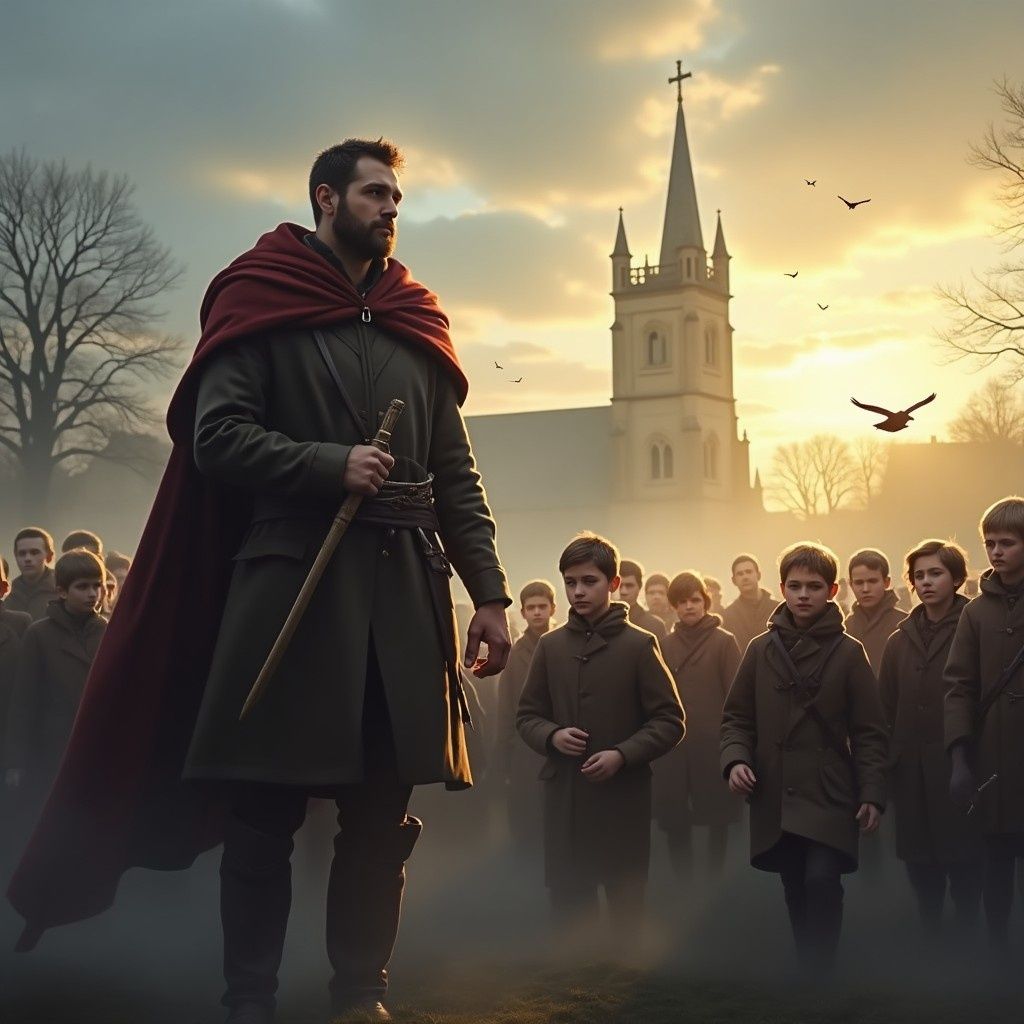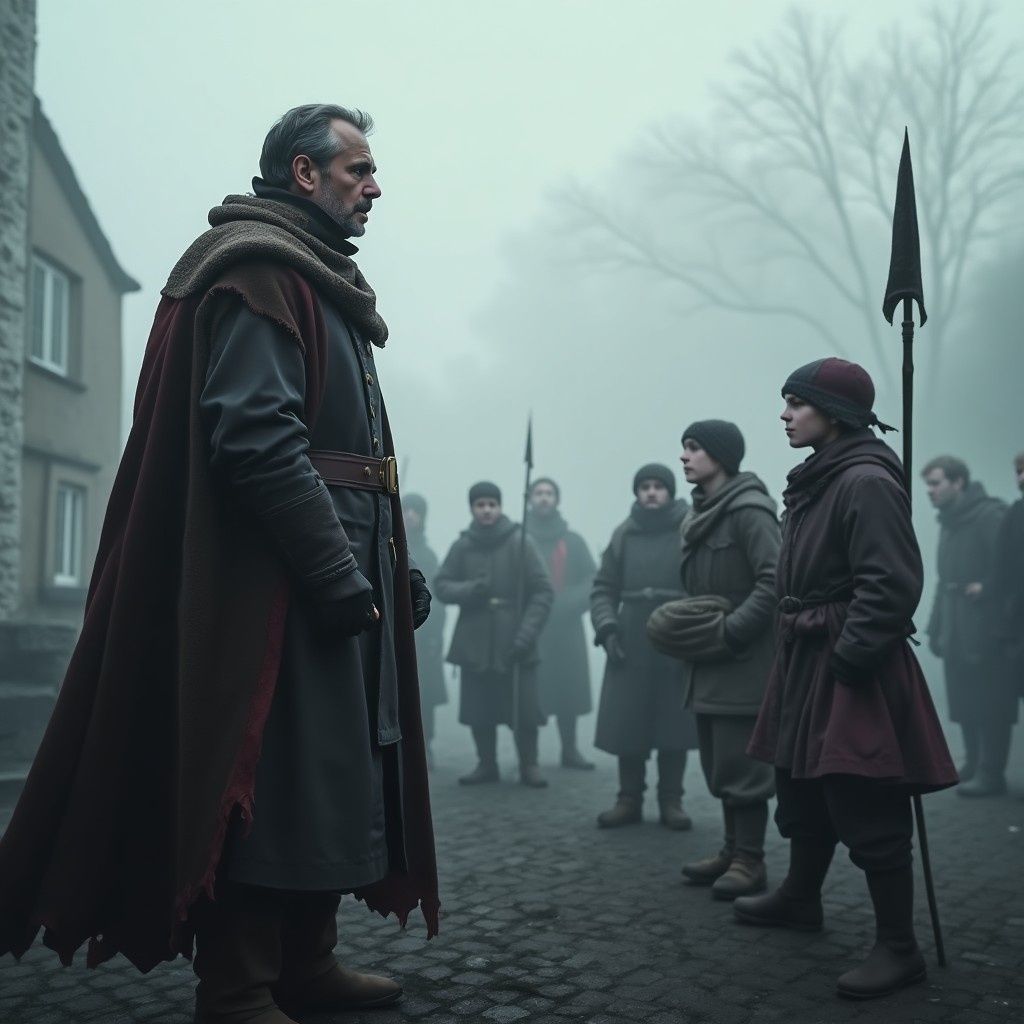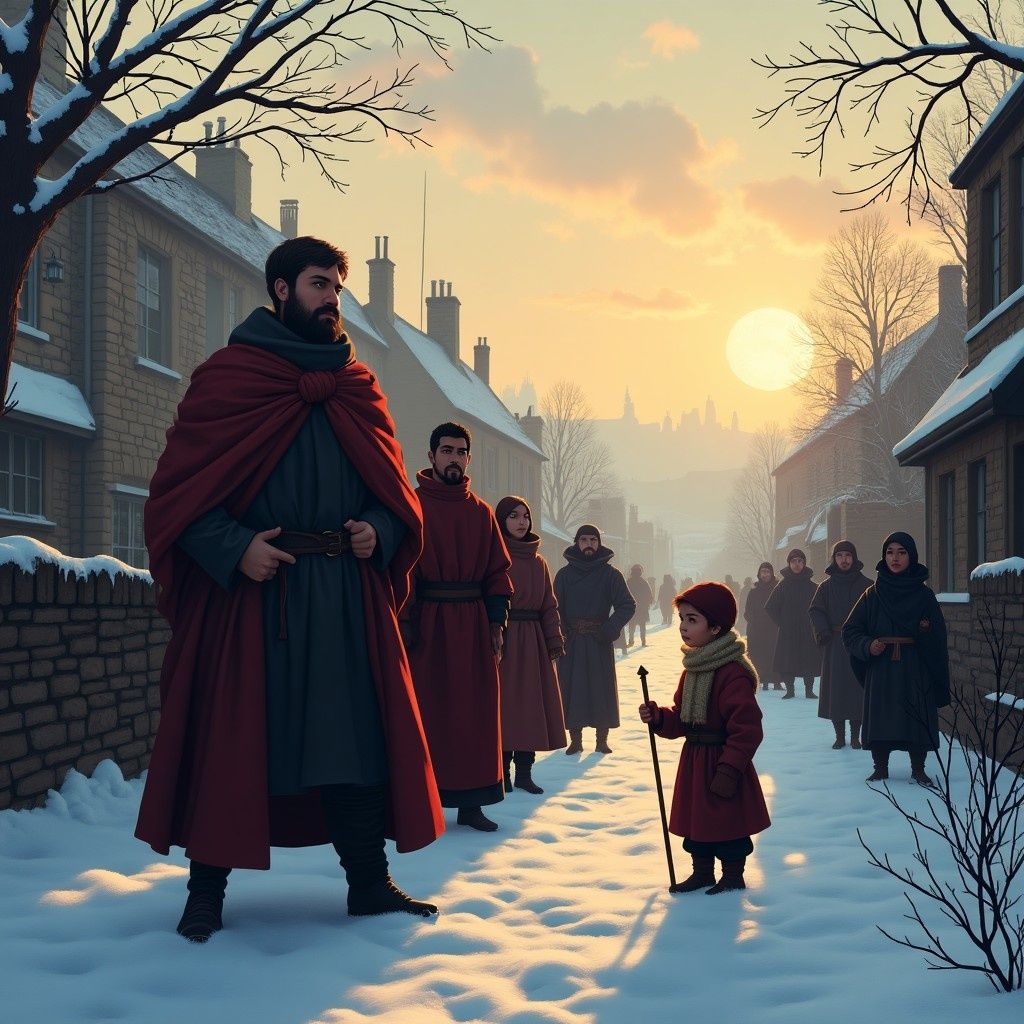In the dim light of a cold January morning, the air was thick with the smell of damp earth and the tension of rebellion. The small village of Beverley, nestled in the heart of Yorkshire, lay shrouded in an uneasy silence, broken only by the distant clatter of hooves. Sir Francis Bigod, a man of conviction and fiery spirit, stood at the helm of a small band of followers, their faces a mix of determination and fear.

Bigod, a tall man with a commanding presence, had always been a fervent believer in the old ways. The sweeping changes of the English Reformation, spearheaded by King Henry VIII, had left him and many others disillusioned and desperate. The promises made by the King after the Pilgrimage of Grace had turned to ash, and the betrayal cut deep. The people had hoped for a return to the familiar comforts of their faith, but instead, they faced the cold reality of unfulfilled vows. As he looked over his ragtag group of rebels, Bigod's heart ached with the weight of responsibility. He had no illusions about the slim chances of success, but the fire of injustice burned too brightly to be ignored. His voice, though steady, carried the strain of a man who knew he was on borrowed time. "We stand here not just for ourselves," he declared, his words echoing through the morning mist. "But for our faith, our families, and our future. We may be few, but our cause is just." Among the crowd, a young woman named Elinor watched him with a mixture of admiration and dread. Her brother, Thomas, stood beside her, clutching a crude spear. Elinor had always been the voice of caution, the one to remind Thomas of the dangers they faced. But even she could not deny the pull of Bigod's passion, the way it stirred something deep within her.

"Do you think we can win?" Thomas whispered, his voice barely audible over the murmurs of the gathering. Elinor hesitated, her eyes meeting Bigod's for a fleeting moment. "I don't know," she admitted. "But I believe in what we're fighting for." The rebellion, however, was doomed from the start. Bigod's plan to incite a larger revolt crumbled as quickly as it had formed. The support he had hoped for never materialized, leaving his forces scattered and vulnerable. The King's men, swift and merciless, descended upon them with the full force of royal wrath. Captured and shackled, Bigod was brought before the King's men, his defiance unbroken even in chains. The trial was swift, the sentence inevitable. As he stood on the scaffold, the cold wind biting at his skin, he felt a strange sense of peace. He had fought for what he believed in, and that was enough.

In the crowd below, Elinor clutched Thomas's hand, tears streaming down her face. The rebellion had failed, but the spirit of resistance lived on in the hearts of those who had dared to dream of a different future. As the axe fell, the sky seemed to darken, a silent testament to the harsh measures of a King determined to consolidate his power. Yet, in that moment of despair, a seed of hope was planted, a reminder that even in the face of overwhelming odds, the human spirit could not be so easily extinguished. The rebellion may have been crushed, but the story of Sir Francis Bigod and his followers would echo through the ages, a testament to the enduring struggle for faith and freedom in a world forever changed by the tides of history.

Bigod, a tall man with a commanding presence, had always been a fervent believer in the old ways. The sweeping changes of the English Reformation, spearheaded by King Henry VIII, had left him and many others disillusioned and desperate. The promises made by the King after the Pilgrimage of Grace had turned to ash, and the betrayal cut deep. The people had hoped for a return to the familiar comforts of their faith, but instead, they faced the cold reality of unfulfilled vows. As he looked over his ragtag group of rebels, Bigod's heart ached with the weight of responsibility. He had no illusions about the slim chances of success, but the fire of injustice burned too brightly to be ignored. His voice, though steady, carried the strain of a man who knew he was on borrowed time. "We stand here not just for ourselves," he declared, his words echoing through the morning mist. "But for our faith, our families, and our future. We may be few, but our cause is just." Among the crowd, a young woman named Elinor watched him with a mixture of admiration and dread. Her brother, Thomas, stood beside her, clutching a crude spear. Elinor had always been the voice of caution, the one to remind Thomas of the dangers they faced. But even she could not deny the pull of Bigod's passion, the way it stirred something deep within her.

"Do you think we can win?" Thomas whispered, his voice barely audible over the murmurs of the gathering. Elinor hesitated, her eyes meeting Bigod's for a fleeting moment. "I don't know," she admitted. "But I believe in what we're fighting for." The rebellion, however, was doomed from the start. Bigod's plan to incite a larger revolt crumbled as quickly as it had formed. The support he had hoped for never materialized, leaving his forces scattered and vulnerable. The King's men, swift and merciless, descended upon them with the full force of royal wrath. Captured and shackled, Bigod was brought before the King's men, his defiance unbroken even in chains. The trial was swift, the sentence inevitable. As he stood on the scaffold, the cold wind biting at his skin, he felt a strange sense of peace. He had fought for what he believed in, and that was enough.

In the crowd below, Elinor clutched Thomas's hand, tears streaming down her face. The rebellion had failed, but the spirit of resistance lived on in the hearts of those who had dared to dream of a different future. As the axe fell, the sky seemed to darken, a silent testament to the harsh measures of a King determined to consolidate his power. Yet, in that moment of despair, a seed of hope was planted, a reminder that even in the face of overwhelming odds, the human spirit could not be so easily extinguished. The rebellion may have been crushed, but the story of Sir Francis Bigod and his followers would echo through the ages, a testament to the enduring struggle for faith and freedom in a world forever changed by the tides of history.
Bigod's Rebellion in January 1537 was an armed uprising by English Catholics in Cumberland and Westmorland against King Henry VIII, led by Sir Francis Bigod. The rebellion followed the Pilgrimage of Grace, as promises made by the King were unfulfilled, leading to unrest despite efforts by Robert Aske to prevent further conflict. Bigod's plan to incite a larger revolt failed due to lack of support, resulting in his capture and the rebellion's swift suppression. The aftermath saw harsh reprisals, with Bigod and many others executed for treason, highlighting the severe measures Henry VIII took to consolidate his power and suppress dissent. This event underscores the tension between the monarchy and regional factions during the English Reformation.


Comments
Post a Comment